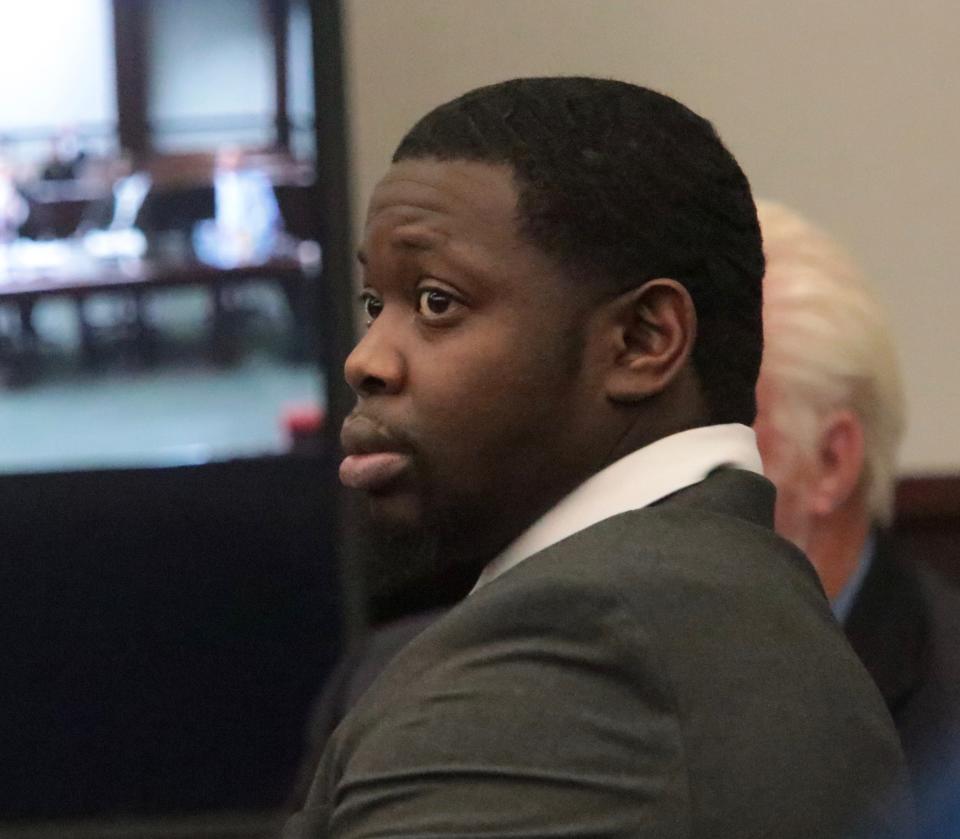Jury opted for manslaughter verdict for Othal Wallace rather than first degree murder. Why?
The verdict of manslaughter against cop killer Othal Wallace on Sept. 16 prompted shock and outrage among the law enforcement community and beyond. Prosecutors argued for a first-degree murder conviction and were seeking the death penalty. Jurors disagreed and convicted him of the lesser charge.
So what happened? What was the jury thinking?
Wallace, 31, was charged with first-degree murder in the killing of Jason Raynor on June 23, 2021, in Daytona Beach. The 26-year-old Raynor remained hospitalized until his death on Aug. 17, 2021, according to the reporting of Frank Fernandez of the News-Journal, who has covered this case since day one.

The jury was made up of nine women and five men, including one Black man and one Black woman. The panel included three alternates.
We don't know what was on their minds as they deliberated, poring over 21 pages of jury instructions, an unenviable task. We know people are angry as evidenced by a court order put in place protecting their identities. It notes the case has generated a "following in social media platforms such as blogs," and "some of the postings and messages in these platforms can be construed as bitter, virulent, and at times hostile..."
Volusia County Sheriff Mike Chitwood, who was chief of the Daytona Beach Police Department for 10 years, wrote in part on his Facebook page: "My faith in the American jury has been shaken before. I have seen juries ignore video evidence and disregard victims. I have never been more disgusted by a verdict than I am today."
His post drew more than 360 comments, mostly angry about the verdict and the jury's decision, including this one: "Disgusting verdict. Shame on those jurors!"
Social media comment
The jury's decision hinged on two key elements. First, it did not consider the murder to be premeditated, which is required for a first-degree murder conviction. Second, the members apparently sympathized with the notion that Wallace was defending himself during the scuffle with Raynor.
The prosecutors used as evidence of premeditation a June 7, 2021 post on social media: "1 Day I Will Take Great Pride And Honor In Getting Me Some Pigs Blood On My Hands And Boots," it reads. "I Pray Against My Enemy And Wish Death To All Who Are Oppressive To The Black Culture… Black Power!!"
According to the Anti-Defamation League, Wallace was affiliated with several Black nationalist groups, including at one time, the "Not (expletive) Around Coalition," a paramilitary group that advocates for Black liberation and separatism.
Defense attorney Tim Pribisco said the statements were not relevant and were made in the context of the politics in the country; he said they did not show Wallace was pre-planning a crime.
Judge Raul Zambrano admitted the statements, saying they were relevant. "It's a pretty damning statement," Zambrano said, as quoted by the News Journal.
Self defense?
Wallace testified on his own behalf, a decision that surprised trial watchers. Such a decision is usually discouraged by defense attorneys for fear the prosecution will tear the defendant apart on cross-examination.
Wallace said he was in fear for his life. And he was armed. He pulled a gun from his pocket during the scuffle with Raynor and shot him in the head. Raynor's gun never left its holster.
The jury, which deliberated for 14 hours, apparently paid close attention to a Florida law that says a person has a right to defend himself even when encountering law enforcement, which was referenced in the jury instructions.
The law says if an officer uses excessive force to make an arrest, then a person is justified in the use of or threatened use of "reasonable force" to defend himself "but only to the extent [he] [she] reasonably believes such [force] [or] [threat of force] is necessary," the statute reads.
Body camera footage showed Wallace sitting in his car when Raynor approached him. Raynor asked him if he lived there at the apartment complex where he was approached and Wallace was unresponsive, asking "What's going on?" Wallace stood, the scuffle ensued, and there was a gunshot.
Three days later, police found Wallace on a property in DeKalb County, Georgia, hiding in a treehouse armed with an arsenal of weapons and ammunition.
Jury pardon?
Clearly jurors were perplexed based on questions they sent to the court during their deliberations. Something was up.
"Is it lawful for an officer to physically restrain a citizen as a form of detainment?" jurors asked the judge.
They had a number of options in terms of the ultimate verdict. They could have found Wallace guilty of second-degree murder, which can draw a sentence of life in prison. The manslaughter verdict, with a firearm involved, calls for a prison sentence of up to 30 years.
But they decided what they decided. And that did not satisfy Daytona Beach Police Chief Jakari Young.
"It is difficult to come to terms with a verdict that is not commensurate with the despicable crime that was committed or the loss that we and Jason’s loved ones have endured," Young wrote in a lengthy response to the verdict. "Jason was a young man with a full life ahead of him and his life was senselessly cut short. There is no verdict that would bring Jason back or change how his life ended, but a verdict that brought justice to his surviving family would have offered some semblance of solace."
This article originally appeared on The Daytona Beach News-Journal: Why didn't a jury sentence Othal Wallace to first-degree murder?

